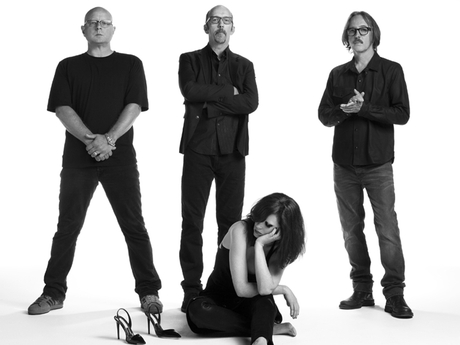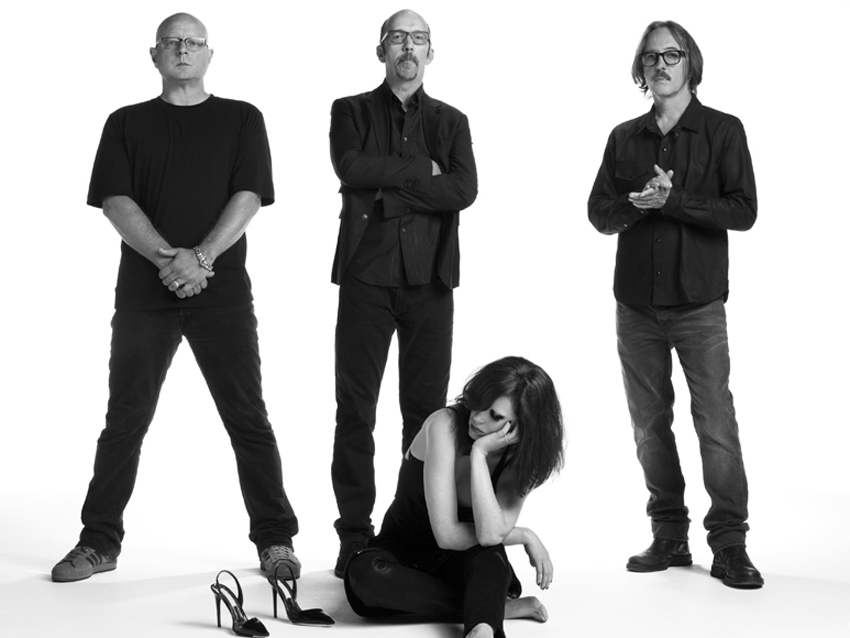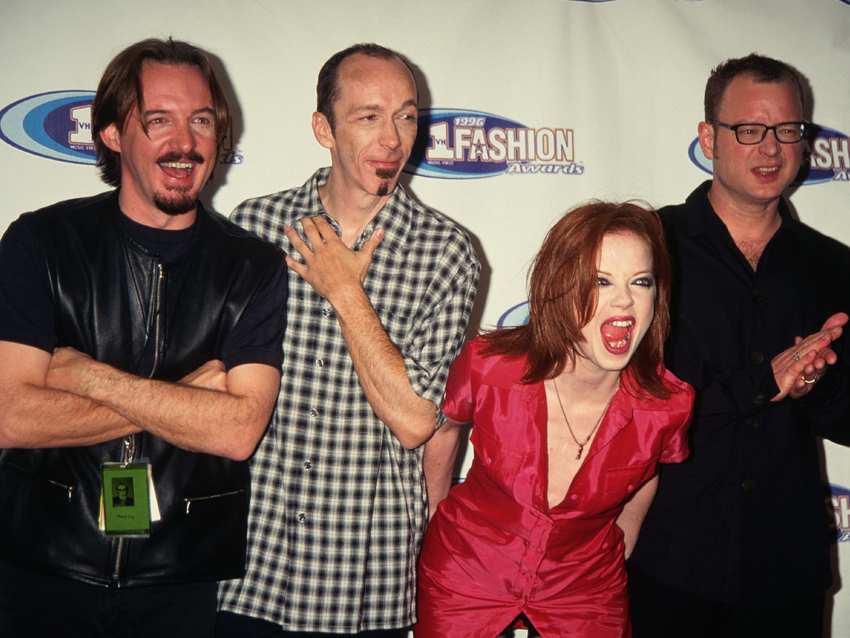

For the cutting-edge band Garbage (left to right, Steve Marker, Duke Erikson, Shirley Manson and Butch Vig), 2012 looks to be a big year, indeed.
Butch Vig says that the new Garbage album, slated for release in the first quarter of 2012, is almost finished. But with two songs left to mix, he admits that some band members aren't yet ready to let go.
"Shirley [Manson, Garbage's lead singer] told me the other day that she was going to be sad when the record is done," he says. "It's been a lot of fun going to the studio. It's like our own little clubhouse. But we have to finish; otherwise, we'll spend another year just tinkering. It's time to be done so we can go play the songs live."
It's been six years since Garbage's last album, 2005's Bleed Like Me, a period of time which saw the members (in addition to drummer Vig and Manson, the group also includes guitarist Steve Marker and bassist Duke Erikson) involved in various projects - Vig, of course, produced big name acts such as Green Day and the Foo Fighters, and Manson recorded an unreleased solo album and had success as an actress.
The news that Garbage had reunited and have a new disc is big stuff, however. A first single from the 11-song, still-untitled record is due in January. While the band mixes away, MusicRadar sat down with Vig, Erikson and Marker - do we call them "Garbage men"? Much too easy - to get the skinny on how the gang got back together, and what kinds of new gear they like to play with when they do that thing they do.
The band's hiatus, as it were - was it always intended to be just that? Was a real breakup considered?
Steve Marker: "We needed time off. We'd done a lot of touring, and then we hit some brick walls on a business level. The music industry pretty much imploded. We needed to clear the air some. Still, we did send ideas back and forth. Garbage has always been very important to us."
Get the MusicRadar Newsletter
Want all the hottest music and gear news, reviews, deals, features and more, direct to your inbox? Sign up here.
Butch Vig: "I always thought we were just taking a break. I thought it last a couple of years, but then everybody started doing their own things. I started producing full-time, and then I had a daughter, so I turned a lot of my attention to raising her."
Duke Erikson: "There was probably a period during the last record where we considered a permanent break, but we got over it. I think we had it in the backs of our minds that we'd do something again, but I don't know if we knew it would be a full record."
What was the catalyst for getting back together? Was there any one thing that did it?
Vig: "It was really Shirley who kind of got the ball rolling. About a year ago, we were all together in LA for a birthday, and Shirley suggested that we book a room and jam. And that's what we did, although we did spend a lot of time telling stories and drinking wine. [laughs] Eventually, we did get around to playing some music. Before you knew it, we had three or four real song ideas."
Erikson: "But we didn't go right into making-a-record mode. It took a bit of time for us to realize that we were going to make an album."
You're not tied to a label right now…
Marker: "No, we're not, which is terribly exciting. It looks like we'll put the new record out on our own in the United States - we might not be able to do that everywhere. But it'll definitely be a guerilla, seat-of-the-pants thing. It'll be fun."
Vig: "It's a new playing field for us. We don't have to answer to anybody. We can do what we want. Having that freedom has been great on a creative level. We wrote something like 26 songs, so we have a lot left over for films and TV and B-sides and various other things. We'll probably give some songs away on our website. Eventually, we'd like everything to come out."
Were you all writing over the past few years with the thought that anything could conceivably be for Garbage?
Vig: "We all write in various ways. There's a lot of different vibes going on, which you'll hear on the new record. We love noise and big beats, atmospheric film soundtracks, and we love electronica and rock and pop. Put all of that together, and that's who we are."
Erikson: "I'm always writing and filing things away. Some things I might have had in the back of my mind for Garbage, and some things wound up on the record."
Vig: "The jamming we did was very important. I think that's when we all realized the spark was still there, and a few songs did come out of that process."
Because you're such a studio-savvy bunch, people don't often picture you guys getting together and making some noise.
Erickson: "'Noise' being the operative word. [laughs] We've done that on every record, actually - well, maybe not the first one. But we love to throw ideas around like that. Some of it sticks. We're not strictly studio geeks."
Marker: "Jamming is great for us. Butch, Duke and I go back a long ways. It's surprising when we get together - we still play the same way we always did. Two years can go by, but when we get in room, we fall right in."
Vig: "Even if we're rusty, we lock in fast. We don't really think about anything when we're jamming; we just play and stuff happens. We're not critical, either - if something sounds good, we try to keep it."

The Garbage team give a shout-out at a fashion show event in 1996. © Mitchell Gerber/CORBIS
With everybody basically acting as producers, is it a real democracy, or does somebody have to shout the loudest to get a deciding vote?
Erikson: "There wasn't a lot of shouting on this record. It's a democracy to a fault, to the point where it's a real pain in the ass sometimes." [laughs]
Marker: "You do have to jump up and down and fight for your viewpoint every now and then. It can slow things down. We've joked that it would probably be easier if we had a real leader or one genius songwriter, but that's not our situation."
What basic changes to your gear have you made during the past five or six years?
Vig: "I got a Dunnett snare drum that I like a lot. Tre Cool from Green Day gave it to me. It sounds incredible. I want to take it on tour, but it's pretty heavy - it's like a big piece of bronze pipe. [laughs] I'm still playing a DW kit."
Erikson: "I bought a couple of guitars. Nothing key. I have a lot of guitars, but I'm still playing my Guild Starfire and my Fender Telecaster. When we play next year, we'll incorporate some of the new technology that's out there. But I can't think of anything recently that's affected our music all that much."
Marker: "I think the biggest thing is that we've really learned how to wrestle Pro Tools and the whole digital thing to the ground. We try to integrate older, cruder technology into what we do."
On the subject of technology, and being that you guys certainly know your way around a studio, do you sometimes feel that you have too many options?
Erikson: "It can feel that way at times, yes."
Vig: "Our sonic palette is pretty huge. All of us have our own studios. I have a lot of analog and digital gear. But we've always embraced it all, and we like to mix and match sounds. We did have a lot of choices when making this record."
Erikson: "I've always found that the best ideas come out of limitations and having to be resourceful. There are a ridiculous amount of tracks on some of these new songs. One song has over 200 tracks going at one point. [laughs] But on another track there's only 20."
Marker: "We went back and found a lot of old, sound-generating boxes. You have to look beyond what's happening now, which, in our case, meant going backwards. I do work on my laptop, though - it's very convenient, and I can send files to everybody."
Vig: "As the process of the record went along, we sort of found things that worked and defaulted to them sometimes. A certain guitar amp or a pedal, a drum kit or a microphone...even though we could switch things around and do something completely different, you do find that a certain piece of gear is the right thing for that performance."
Is there one single new piece of gear that you now consider essential?
Vig: "That's hard to say. You have to start at the source, and that's Shirley's vocal. There are some mics that we like. We have a Klaus Brauner, and then there's a couple of Elams that are great, a 251, and I have a vintage Elam that's amazing.
"Billy [Bush, Garbage's sound engineer and live tech] has a lot of guitars, some Gretsches, Gibsons and Fenders - there's a couple of custom Telecasters. We end up using a lot of them.
"One thing I really do like is a plug-in called a Decapitator. It's like a compressor that you can distort, you can overload it with harmonics. It sounds great on drums, bass, vocals - you can control the amount of saturation and the tone of the saturation. And in the mix you use it to make things all crazy-sounding.
"I also like using iZotope Trash when I want to distort something and give it some character. I like Chandler Limited preamps, and I'm also using the Helios 500 racks. And then there's Harrison EQs, a couple of API preamps and a Chandler Limited Little Devil preamp."
When Garbage first started, combining techo and hip-hop beats with pop and rock was still a blank page. Now that everybody's done it, where have you decided to go?
Vig: "I think, after we did our last record, we knew we had to reinvent ourselves. People did emulate what we were doing, and we didn't want to follow a formula.
Marker: "What's happened since we came out has forced us to look at the power of the song. You can add any treatment to anything, but it doesn't matter if you don't have great songs. Nobody's too impressed by beats; you've got to have a song."
Vig: "We went more for more of a big guitar sound. We didn't want to layer too much this time. On some things we did, but for the most part we tried to keep things direct."
Erikson: "The new record sounds like classic Garbage. It sounds fresh. But really, when you've got Shirley Manson as your vocalist, you can't go wrong."
Joe is a freelance journalist who has, over the past few decades, interviewed hundreds of guitarists for Guitar World, Guitar Player, MusicRadar and Classic Rock. He is also a former editor of Guitar World, contributing writer for Guitar Aficionado and VP of A&R for Island Records. He’s an enthusiastic guitarist, but he’s nowhere near the likes of the people he interviews. Surprisingly, his skills are more suited to the drums. If you need a drummer for your Beatles tribute band, look him up.
"Reggae is more freeform than the blues. But more important, reggae is for everyone": Bob Marley and the Wailers' Catch a Fire, track-by-track
“Part of a beautiful American tradition”: A music theory expert explains the country roots of Beyoncé’s Texas Hold ‘Em, and why it also owes a debt to the blues










